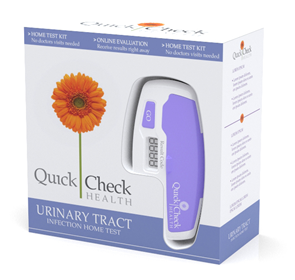QuickCheck Health offers care delivery model that marries DTC diagnostic tests with physician review and follow-up
In an interesting twist on the direct-to- consumer (DTC) diagnostic testing market, QuickCheck Health (QCH) is developing a DTC testing platform that brings clinician oversight into the process.
Most pathologists and clinical laboratory managers know that over-the-counter (OTC) testing is one of the faster growing market segment of in vitro diagnostics. A number of OTC products—including tests for urinary tract infections, pregnancy, ovulation, fertility, HIV, and other conditions—are already on the market, stated an article in Technology Review.
However, the existing direct-to-consumer testing model has at least two drawbacks. First, treatment or follow-up care for these DTC tests requires a visit to the doctor. Second, most physicians are reluctant to treat with medication without validating the DTC test results generated by patient self-testing.
Medical Laboratory Tests Purchased From Retailers
QuickCheck Health hopes that its direct-to-consumer testing platform will change that, the Technology Review reported. QCH’s home-use test requires that the patient log on to a website or call to learn the results. If the medical laboratory test result is positive, then the patient is directed to an online healthcare provider who can prescribe treatment.

Here is how QuickCheck Health plans to package its direct-to-consumer test for urinary track infections, once it has obtained regulatory approval to be marketed. The consumer would be put in contact with a clinician to discuss the results and get any needed prescriptions. (photo by www.quickcheckhealth.com.)
“That confirmation [with a healthcare provider] makes us different and valuable to consumers and physicians,” said Tom Henke, CEO of QuickCheck Health, in the Technology Review article. The remote clinician processes the visit and, as needed, sends a prescription to the patient’s pharmacy.
According to QuickCheck Health’s website, in most cases, the clinic visit fee is eligible for health plan coverage. The patient is directed to print out a clinic receipt for submission to his or her health insurance plan.
QuickCheck Health’s website is aimed at physicians, employers, and consumers. The website lays out the benefits of the QCH model for each of these healthcare entities.
The model involves partnering with a sole physician in geographically-specific areas to treat patients who have used QCH tests, as noted on the QCH web page for providers. Each physician in a region benefits from prepaid, online clinic visit revenues and a greater number of patients because of QCH patient referrals.
For employers, QuickCheck Health points out on its web page, advantages of its direct-to-consumer testing model over traditional doctor office visits. These include earlier return to work, significant cost reduction, and in some instances condition monitoring or biometric screening. In an example of a typical use of the DTC test model, QCH indicates that where the diagnostic test is negative, savings can be as much as $90 to $200 or more. Should the test be positive, potential savings would range between $45 to $155 or more.
Target pricing for QCH’s physician referral service is about $10 and $35 for the online clinic visits, according to the QCH website.
QCH is developing DTC tests that use urine samples or a throat swabs on existing chemical assays to detect infections or other issues. The results are then encoded using proprietary hardware. The company has also developed software for the website and database that patients and physicians will access, the Technology Review stated.
Experts Predict More Direct-to-Consumer Test Kits Will Come to Market
QCH has developed a prototype of its urinary tract infection test and is planning trials to get consumer feedback on the design. The company will need approval from the U.S. Food and Drug Administration to market this test.
Going forward, pathologists and clinical laboratory managers should expect that companies developing direct-to-consumer diagnostic tests will be innovative in ways that address clinical and patient safety concerns. Greater acceptance of certain new DTC tests by office-based physicians would also continue the trend toward non-traditional delivery of healthcare services.
—Pamela Scherer McLeod
Related Information:
British Health Authorities Criticize Medical Laboratory Tests for Consumers



